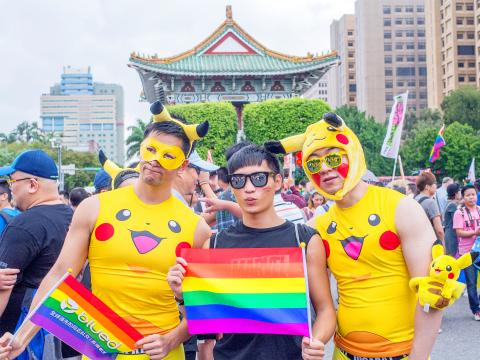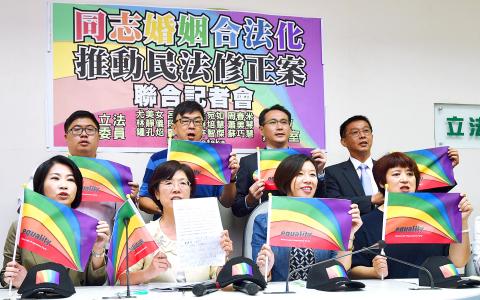To celebrate “pride month,” downtown Taipei once again transformed into a huge rainbow burst of music, dancing and cheering yesterday, as tens of thousands of lesbian, gay, bisexual and transgender (LGBT) people and their supporters proudly marched at the 14th Taiwan LGBT Pride parade (台灣同志遊行), one of Asia’s largest LGBT events.
With this year’s theme, “Fun together — honor diversity, like you mean it” (一起Fun出來—打破「假友善」,你我撐自在), organizers called on the public to break through “fake friendliness” when it comes to LGBT people.
“From gender stereotypes and HIV stigmas to sexual exploitation, this fake friendly attitude is only a cover that conceals discrimination,” wrote the organizers.

Photo: Paul Cooper, Taipei Times
Statements such as “I respect homosexuals, but they shouldn’t violate traditional family values” may not seem harmful, but do in fact express a discriminatory attitude.
“Such statements make discrimination subtler and more difficult to detect,” the organizers wrote.
LEE’S HATE SPEECH

Photo: Chien Jung-fong, Taipei Times
A typical example of such “fake friendliness” are the words recently uttered by Taiwanese actor Mark Lee (李天柱) at the 51st Golden Bell Awards (金鐘獎) in Taipei early this month.
“I don’t hate gay people. I love them, and I also have compassion for them. But I have to say that [being gay] is wrong,” Lee said.
The Christian actor flaunted his true colors backstage when he launched a homophobic rant after winning a Golden Bell Award for best actor in a miniseries or television film.
“I’ll be open about it. I don’t support homosexuality because it’s going to lead to the destruction of humanity and that of the nation,” Lee said.
Lee has rejected several gay-themed TV productions that have approached him. “I won’t betray my faith just for a little money. This is wrong. Homosexuality is a huge curse to our future generations,” the actor said, adding, as though we didn’t get it the first time: “What a curse.”
Lee says he is compassionate about difference, but his words are nothing but hate speech wrapped up in “fake friendliness.” Naturally, his remarks have caused outrage both at home and abroad — a reverse kind of “pride of Taiwan” (台灣之光).
It is worth noting that Lee made the remarks during an interview with Good TV (好消息電視台), a Christian-focused TV station funded by Gabriel Broadcasting Foundation (加百列福音傳播基金會), which targets a Christian audience.
“Lee’s offensive remarks are just the tip of the iceberg,” said social activist Jennifer Lu (呂欣潔) on Thinking-Taiwan (想想台灣), an online forum. “The massive amounts of money and power behind certain religious figures and TV stations, and their lack of understanding of LGBT people is what we face every day.”
A TEACHER’S DEATH
Following Lee’s outburst, the LGBT community was shocked to learn of the alleged suicide of French teacher Jacques Picoux, a tragedy that once again highlighted the woefully inadequate legal protection of same-sex couples.
Picoux moved to Taiwan in 1979 and taught at National Taiwan University until he retired in 2004. His same-sex partner Tseng Ching-chao (曾敬超), with whom he lived for 35 years, was the global agent for Chinese actress Gong Li (鞏俐).
Following Tseng’s death in October last year due to cancer, Picoux feel into a deep depression. Two weeks ago he allegedly jumped from the 10th floor of his apartment building.
The media reported that the couple had bought the apartment together under Tseng’s name. Against Tseng’s wishes, his brother inherited the property because, according to the Civil Code (民法), Picoux was “unrelated” to Tseng.
“They were ‘legal strangers’ (法律上的陌生人) after living together for 35 years,” wrote Lee Yen-jong (李晏榕), a lawyer and Picoux’s former student, on her Facebook page. “Despite their 35 years together, they were trampled by others just because they were not in a formal marital relationship,” the lawyer added, revealing that Picoux was not allowed to make any medical decisions for Tseng when he fell ill.
The case of Picoux and Tseng, and remarks by Mark Lee, are not the first of their kind, and certainly won’t be the last. The good news is that, on the eve of the gay parade, some legislators have announced a draft amendment to the Civil Code to legalize same-sex marriage. A total of 38 lawmakers from all parties except the People First Party have already signed it to support the draft bill. Could Taiwan be the first in Asia to legalize same-sex marriage? Taipei Watcher will discuss this more next month.

Taiwan has next to no political engagement in Myanmar, either with the ruling military junta nor the dozens of armed groups who’ve in the last five years taken over around two-thirds of the nation’s territory in a sprawling, patchwork civil war. But early last month, the leader of one relatively minor Burmese revolutionary faction, General Nerdah Bomya, who is also an alleged war criminal, made a low key visit to Taipei, where he met with a member of President William Lai’s (賴清德) staff, a retired Taiwanese military official and several academics. “I feel like Taiwan is a good example of

March 2 to March 8 Gunfire rang out along the shore of the frontline island of Lieyu (烈嶼) on a foggy afternoon on March 7, 1987. By the time it was over, about 20 unarmed Vietnamese refugees — men, women, elderly and children — were dead. They were hastily buried, followed by decades of silence. Months later, opposition politicians and journalists tried to uncover what had happened, but conflicting accounts only deepened the confusion. One version suggested that government troops had mistakenly killed their own operatives attempting to return home from Vietnam. The military maintained that the

Jacques Poissant’s suffering stopped the day he asked his daughter if it would be “cowardly to ask to be helped to die.” The retired Canadian insurance adviser was 93, and “was wasting away” after a long battle with prostate cancer. “He no longer had any zest for life,” Josee Poissant said. Last year her mother made the same choice at 96 when she realized she would not be getting out of hospital. She died surrounded by her children and their partners listening to the music she loved. “She was at peace. She sang until she went to sleep.” Josee Poissant remembers it as a beautiful

Before the last section of the round-the-island railway was electrified, one old blue train still chugged back and forth between Pingtung County’s Fangliao (枋寮) and Taitung (台東) stations once a day. It was so slow, was so hot (it had no air conditioning) and covered such a short distance, that the low fare still failed to attract many riders. This relic of the past was finally retired when the South Link Line was fully electrified on Dec. 23, 2020. A wave of nostalgia surrounded the termination of the Ordinary Train service, as these train carriages had been in use for decades